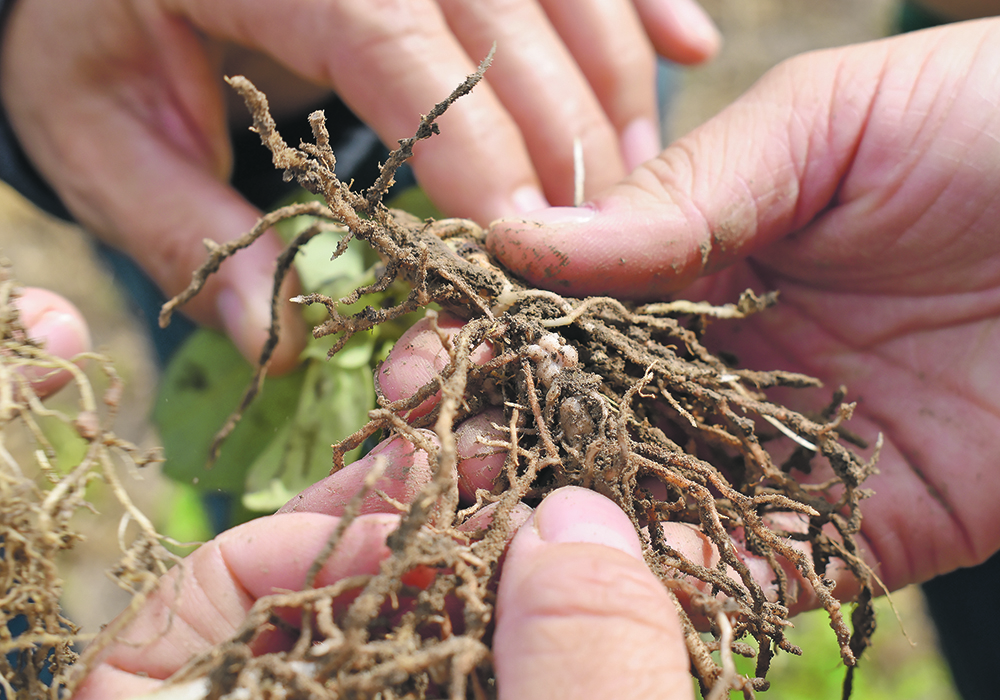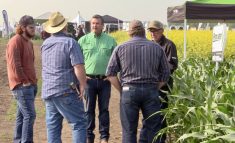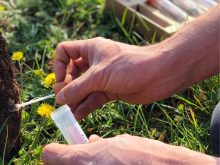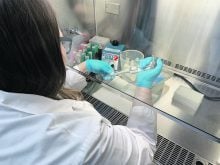WINNIPEG —Dave Franzen is a straight shooter.
If he doesn’t know the answer, the North Dakota State University soil scientist will admit it.
If he does, he’ll tell you.
As an example, in the summer of 2022 researchers from land grant universities across the north-central United States studied commercially available, biological nitrogen-fixing products to see if they increase crop yields.
The results were collected, analyzed and the scientists published a paper in 2023.
Franzen, the lead author, said the products rarely worked.
Read Also

Farmers urged to be grain-safe this fall
Working around grain bins comes with risk, from farmers falling to drowning in grain: Experts have five tips to help avoid grain-related accidents this harvest.
“There was a very low frequency of what a farmer would call success,” he told an audience of growers, agronomists and industry reps at the CropConnect conference held Feb. 14-15 in Winnipeg.
The agricultural market for bacteria that can fix nitrogen and possibly deliver it to a plant is an emerging part of crop production.
Many companies, including global firms, are promoting their biologicals as products that can boost crop yield or allow a producer to cut fertilizer rates.
Many growers are curious about these products, especially in years when fertilizer prices are high.
Franzen’s paper, which can be found here, reported only two cases where the biological products had an impact on yield.
“Sixty-one site years of N rate trials with and without the use of biological N fixing products were conducted in corn, spring wheat, sugar beet and canola in 10 states,” the report says. “(Only) two site-years in corn had yield increases due to product use over the N rates alone. Given the low rate of positive benefits … growers should be skeptical of products that claim to provide non-symbiotic N-fixation for the purpose of allowing a farmer to decrease fertilizer N rate.”
A success rate of two out of 61 is not great.
However, Franzen remains open to the idea that these products can work.
“It’s not zero anything in the jug. These things are natural.”
Following the publication of the NDSU report, six companies in the biological sector contacted Franzen to discuss his findings.
They acknowledged the challenges of getting biologicals to perform in real world conditions.
One of the main issues is shipping.
It’s difficult to transport the products by plane, train or truck from a manufacturing plant to a farm because some bacteria can be highly sensitive to temperature. For instance, one product is supposed to be stored at four to eight C, Franzen said.
“These things have to be alive to work. That’s the question: what does your supply chain look like? How are you going to keep them alive?”
Another challenge is that thousands or millions of microbes already exist in the soil.
A farmer could add a population of nitrogen fixing bacteria, but there’s no guarantee of survival.
“If you try to put something in there that is foreign, (the other organisms) are going to try and kill it,” Franzen said.
“If it’s not competitive, it will lose.”
Yet another obstacle is that these bacteria don’t live in synergy with the plant — they’re not symbiotic.
“Because they’re not attached to the plant, they’ll never supply all the nitrogen of the plant,” he said.
“They’re going to be limited by the limited supply of food outside of that root.”
Despite the limitations, growers may still be curious about these products and whether they can perform on their farm.
The only way to get that answer is replicated research on the farm, Franzen said.
He clarified that dividing a field in two and using a biological in one half of a field is not a replicated trial.
Farmers need to follow the proper protocols to get a useful result.
Manitoba Pulse & Soybean Growers operates an on-farm network that conducts trials across the province.
It looked at a range of biological products from 2019-23.
“So far, we’ve tested 12 products over 28 trials in three different crops,” said Laura Schmidt, a production specialist with MPSG, who also spoke at CropConnect.
Most of the trials were for soybeans, but they also tested the nitrogen-fixing biologicals on peas and dry beans.
The results were extremely consistent.
“So far, we’ve not seen a yield increase with any of these products that we’ve tested,” Schmidt said, adding she’s 99 percent confident in the results.
“I’m leaving that one percent of the time where we might find this biological product that’s actually going to perform. That is something we would like to find.”
Franzen is also hopeful that the nitrogen-fixing, non-symbiotic products can work.
The evidence isn’t there, as of February 2024, but growers and the crop nutrition industry should be patient.
“We’re always short-sighted about this stuff. This is what we see, right now,” he said.
“But 10 years down the road, when all of this is worked out, if the investors are patient enough … to try and make sure it’s put out there in a manner that would be really beneficial and consistently beneficial to farmers, then you’ll see these kind of things (perform).”
















